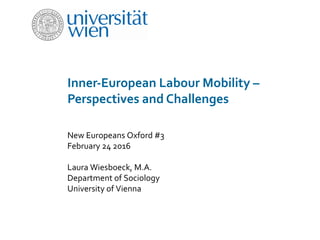Laura Wiesboeck - Inner-European Labour Mobility - Perspectives and Challenges
- 1. Inner-European Labour Mobility ŌĆō Perspectives and Challenges New Europeans Oxford #3 February 24 2016 Laura Wiesboeck, M.A. Department of Sociology University of Vienna
- 2. Background ŌĆó Enhanced mobility promoted as the way forward in EU-policy ŌĆó Idea(l) behind: Economic ŌĆśtriple- winŌĆÖ situation, mobility goverened by economic demand - no integration burden, no naturalization ŌĆó Strong economic lense mainly through receiving countriesŌĆś eye ŌĆó What are the social effects in sending region and on mobile workers themselves?
- 3. Factors influencing mobility ŌĆó Job opportunities ŌĆó Higher income ŌĆó Language in receiving country ŌĆó Social networks ŌĆó Political climate ŌĆó Lifestyle ŌĆó Legal circumstances ŌĆó Economic crisis
- 4. Understanding official data ŌĆó No clear cut category for mobile workers (citizenship, country of birth, length of stay) ŌĆó Mainly dependently employed covered by the social security system ŌĆō independently employed? Informal work? ŌĆó Demand for work?
- 5. Effects in receiving region ŌĆó Employer perspective: foreign born preferred labour force ŌĆó Social dumping / Wage dumping: no reliable data, practices difficult to reveal ŌĆó Infrastructure: governments should not only profit from macro-economic benefits but also address needs at the local level
- 6. Impact on sending region ŌĆó ŌĆ×Youth drainŌĆ£ / ŌĆ×Brain drainŌĆ£: may be temporary or permanent, lack of long term studies ŌĆó Skill shortages: losing workforce in certain branches like healthcare (ŌĆ×care chainŌĆ£) ŌĆó Remittances: basic gain for sending countries, may or may not be development-stimulating, can create different power hierarchies
- 7. Impact on mobile workers ŌĆó Dequalification: form of protectionism ŌĆó Lack of representation: transnational unions? ŌĆó Family: ŌĆ×Eurogeneration left aloneŌĆ£ ŌĆó Lifestyle: adopted consumer behaviour, new symbolic formation of classes ŌĆó Envy: jealous of newly gained economic power, social inequality between mobile and non mobile workers strengthened
- 8. Outlook ŌĆó Noticeably more hostile discourse on migration in most European countries ŌĆó Exploitative dual labour market for Eastern movers working in the west in EU? ŌĆó Focus on economic growth in EU15 countries as main lens should be challenged ŌĆó Free movement of workers one of four freedoms (goods, capital, services) ŌĆō cherry pick the ones states want and leave rest?
- 9. Thank you for your attention! Questions? Answers? laura.wiesboeck@univie.ac.at
- 10. Thank you for your attention! Questions? Answers? laura.wiesboeck@univie.ac.at









